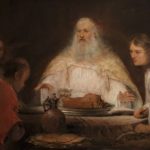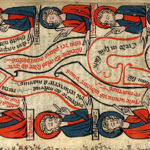In many ways the idea of “family” has been challenged significantly in our culture. There are a variety of factors that have brought this situation about. For instance, the average age of first-time motherhood in Canada has shifted from 23.7 in 1960 to 29.2 in 2016. Certainly, postponing the beginning of a family into one’s late twenties or early thirties has affected people’s view on the family overall. Every parent has experienced the twenty-something, with no kids, telling them how they should manage their children as if they had your kids’ best interest in mind.
Yet, the family is not merely being challenged because of people’s lack of experience. It is also ideologically being challenged by deconstructive post-modern thought which sees the nuclear family as some sort of demonic hegemonic power structure which must be dismantled. Certain members of the LGBTQ+ community—often presenting themselves as an upholder of family with an emphasis on “love”—are a dominant force in dismantling the notion of family that we have inherited from the Judeo-Christian worldview.
In my home country of Canada this can be seen in the recent passing of Bill C-4 which bans conversion therapy. In no way would I want to suggest that conversion therapy as it has been represented by many malevolent practitioners is a good thing, but the language of this bill clearly extends beyond these nefarious practices and treads upon the sacred rights of parents to care for and protect their children.
For example, Bill C-4’s definition of conversion therapy is so broad that it includes any practice meant to “repress or reduce a person’s gender expression that does not conform to the sex assigned to the person at birth.” Theoretically, a three year old could return home from daycare, exclaim that their new pronouns are zie/zim, and the parent—by suggesting to their child that they are wrong—could be held accountable under the law. To repeat, regardless of your views on conversion therapy, this is clearly an attack on the family and significantly challenges parental rights which are bestowed upon us, not by the government, but by the Creator.
We can no longer assume that our society is built upon the same foundations or values that we as a church hold.
Therefore, in the midst of this moral morass it is essential that the church reclaim a Christian view of marriage and family. We can no longer assume that our society is built upon the same foundations or values that we as a church hold. The term “family values” in our culture means something completely different than what it used to.
Rather than rely upon an assumed understanding of the importance of the family for society, we must show society the importance of the family by living out a Christian vision of what family looks like. To do that we must have a robust theology of the family which is precisely where Herman Bavinck’s The Christian Family comes in. Let us explore a few themes from the work which may help us to develop a more robust theology of the family.
Sexual Difference in the Family
The first thing that we must realize about the family is that it is created by God. It is not a social construct that can be arbitrarily changed. Rather, according to Genesis 2, it is a created set of relationships with each person given specifically defined roles in said relationship. This is why sexual difference within a marriage is so important, because the relationships within the family have set boundaries given to them by God for his glory and the good of mankind.
Herman Bavinck writes, “God is the Creator of the human being, and simultaneously also the Inaugurator of sex and of sexual difference. This difference did not result from sin; it existed from the very beginning, it has its basis in creation, it is a revelation of God’s will and sovereignty, and is therefore wise and holy and good. Therefore, no one may misconstrue or despise this sexual difference, either within one’s own identity or in that of another person.”[1] Sexual difference between a man and a woman, a husband and a wife, a mother and a father, is something created by God as good and lays the foundations for a healthy family.
Furthermore, from the sexual difference in the marriage union comes the propagation of children. It is the obedience of children to their parents and the parents’ authority over that child that is the Biblical picture of family life (Exod. 20:12). This leads to, in God’s common grace, human flourishing: “This three-in-oneness of relationships and functions, of qualities and gifts, constitutes the foundation of all of civilized society. The authority of the father, the love of the mother, and the obedience of the child form in their unity the threefold cord that binds together and sustains all relationships within human society.”[2] The family is not therefore any combination of individuals in some contractual way that is united together by a cultural definition of “love.” It consists of a father, a mother, and their children. It consists of grandchildren, grandparents, and siblings. It is something traceable, theoretically all the way back to our first father, Adam.
Family as the Arena for Moral Formation
The family, as it is described above, is also the place where moral formation occurs. In the Old Testament it is the responsibility of the family—largely the parents—to teach the coming generation God’s Law. We see this, for instance, in Deuteronomy 10:19: “You shall teach them to your children, talking of them when you are sitting in your house, and when you are walking by the way, and when you lie down, and when you rise.” The book of Proverbs is largely a father teaching his son the ways of life. In Exodus when God declares his character to Moses, he says that he will visit “the iniquity of the fathers on the children and the children’s children, to the third and the fourth generation” (Exod. 34:7). Insinuating that sinfulness in the father will have effects upon the children, and subsequently their children. It is an act of God’s grace that this only continues to the third and fourth generations. Simply put the family is the place where moral formation occurs.
This formation is not restricted to only the children. On the contrary, it is also something that occurs amongst the mother and father as they experience God’s sanctifying work through parenting. Herman Bavinck elaborates on this when he states, “The family exerts a reforming power upon the parents. Who would recognize in the sensible, dutiful father the carefree youth of yesterday, and who would ever have imagined that the lighthearted girl would later be changed by her child into a mother who renders the greatest sacrifices with joyful acquiescence? The family transforms ambition into service, miserliness into munificence, the weak into strong, cowards into heroes, coarse fathers into mild lambs, tenderhearted mothers into ferocious lionesses. Imagine there were no marriage and family, humanity would, to use Calvin’s crass expression, turn into a pigsty.”[3] Family has a reforming power upon all of its members. To quote Bavinck again, “The family is the school of life, because it is the fountain and hearth of life.”[4]
Family and the Future
If a proper biblical understanding of family is so important, and yet it is being attacked in our culture vociferously, then what are we to do? How can we stand up against these cultural forces that seek to demolish the family. Three things to note from Bavinck.
First, seek to reform your own family first. The institution of the family has been around since the creation of the world. It has been under attack before. It can withstand this cultural onslaught. Thus, to begin the work of valuing the family start with your own. This is exactly what Bavinck would admonish us to do: “If family life is indeed being threatened from all sides today, then there is nothing better for each person to be doing than immediately to begin reforming within one’s own circle and begin to rebuff with the facts themselves the sharp criticisms that are being registered nowadays against marriage and family. Such a reformation immediately has this in its favor, that it would lose no time and would not need to wait for anything.”[5]
Secondly, stand for the family. Family is a wonderful thing that has been given to us in God’s gracious good will. As Christians it is our duty to stand for God’s word even when it is not for our benefit. Again, ponder these words of Bavinck’s, “Even if they come to stand alone, as history has so often obligated them to do, they must show in word and deed what an inestimable blessing God has granted to humanity and to society, to church and state, with the gift of marriage and family.”[6]
Finally, we have a reason for hope. When Jesus Christ preached the gospel, died for our sins, was resurrected to new life, and inaugurated his church the current cultural climate in the Greco-Romans world was diametrically opposed to family life. Marriage was a legal relationship and sexual pleasure was to be found elsewhere in a variety of forms, the killing of unwanted children was a common practice, women were treated as property and were barely considered persons, and more. It was in the midst of this context that the gospel was first preached. It was in this context that the Christian family was first established.[7] Christianity did not destroy the family, but renewed it liberating those who believe in Christ from “spiritual bondage, and precisely in that way recreated earthly relationships.”[8] Therefore, we can have hope. As the Gospel goes forward and more people come to believe in Jesus the family will be a source of “blessing and prosperity” that “will once again spread across all the nation.”[9]
If you are interested in purchasing a copy of Herman Bavinck’s The Christian Family you can do so here.
[1] Herman Bavinck, The Christian Family, 5.
[2] Herman Bavinck, The Christian Family, 8.
[3] Herman Bavinck, The Christian Family, 97.
[4] Herman Bavinck, The Christian Family, 107.
[5] Herman Bavinck, The Christian Family, 63.
[6] Herman Bavinck, The Christian Family, 139.
[7] Herman Bavinck, The Christian Family, 48.
[8] Herman Bavinck, The Christian Family, 50.
[9] Herman Bavinck, The Christian Family, 84.
























